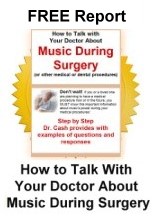Music, the Brain, and Academic Performance
June 21, 2009Music affects many areas of brain function
by Marjorie H. Weil
Recently the Albion School District announced that, beginning this fall, all fifth- through 12th-graders would be required to take band or choir. Why? Because statistics show that students who do so perform better academically, have higher SAT scores, are more self-confident and are better adjusted socially.
This is not news. Many studies over the years have confirmed these findings. Unfortunately, most of these past studies have been anecdotal in nature or are the result of extensive surveys, and there was little that could address the cause-effect relationship – or why and how music affects the learning process.
But that is beginning to change. And Albion may be on to more than they realize. Researchers in neuroscience, utilizing recent advances in MRI technology, are actually studying the human brain in the act of creating, or listening to, music. And what they are finding is remarkable.
One of the leaders in this field is Dr. Daniel J. Levitin, author of “This Is Your Brain On Music.” Published in 2006, the book remained on the New York Times best-seller list for over a year and has been translated into 11 languages. I felt fortunate to hear Dr. Levitin speak last fall at the 75th anniversary celebration of Western Michigan University’s School of Music Therapy. His work and that of other neuroscientists in “brain-mapping” is challenging several previously held beliefs.
Where it was once thought, for example, that a particular region of the brain was dedicated to music, it has now been shown that music actually affects many areas of brain function. Combined with the fact that music is a basic part of every human culture around the globe has led Levitin to conclude that the human brain is actually “hard-wired” for music, and music may be even more fundamental to our species than language.
Understanding the strong connection between the auditory and motor regions of the brain has made it possible for people with motor disorders such as Parkinson’s disease to improve their ability to walk while listening to a rhythm track, and stroke patients have been able to improve their speech through music therapy.
Perhaps the most exciting news, however, is that there is new evidence that music can actually change the physical structure of the brain – a fact that has critical implications for both education and medicine. Music may even be a major key to unlocking the mystery of how the brain actually learns.
by Marjorie H. Weil
Recently the Albion School District announced that, beginning this fall, all fifth- through 12th-graders would be required to take band or choir. Why? Because statistics show that students who do so perform better academically, have higher SAT scores, are more self-confident and are better adjusted socially.
This is not news. Many studies over the years have confirmed these findings. Unfortunately, most of these past studies have been anecdotal in nature or are the result of extensive surveys, and there was little that could address the cause-effect relationship – or why and how music affects the learning process.
But that is beginning to change. And Albion may be on to more than they realize. Researchers in neuroscience, utilizing recent advances in MRI technology, are actually studying the human brain in the act of creating, or listening to, music. And what they are finding is remarkable.
One of the leaders in this field is Dr. Daniel J. Levitin, author of “This Is Your Brain On Music.” Published in 2006, the book remained on the New York Times best-seller list for over a year and has been translated into 11 languages. I felt fortunate to hear Dr. Levitin speak last fall at the 75th anniversary celebration of Western Michigan University’s School of Music Therapy. His work and that of other neuroscientists in “brain-mapping” is challenging several previously held beliefs.
Where it was once thought, for example, that a particular region of the brain was dedicated to music, it has now been shown that music actually affects many areas of brain function. Combined with the fact that music is a basic part of every human culture around the globe has led Levitin to conclude that the human brain is actually “hard-wired” for music, and music may be even more fundamental to our species than language.
Understanding the strong connection between the auditory and motor regions of the brain has made it possible for people with motor disorders such as Parkinson’s disease to improve their ability to walk while listening to a rhythm track, and stroke patients have been able to improve their speech through music therapy.
Perhaps the most exciting news, however, is that there is new evidence that music can actually change the physical structure of the brain – a fact that has critical implications for both education and medicine. Music may even be a major key to unlocking the mystery of how the brain actually learns.








Well done for bringing this research more out into the open. The treatment implications for my clients, – children with brain injuries, are phenomenal. I have known for a while that music has a ppositive influence on brain function, but to have it scientifically confirmed it wonderful. Music forms a vital part of all Snowdrop rehabilitation programmes.